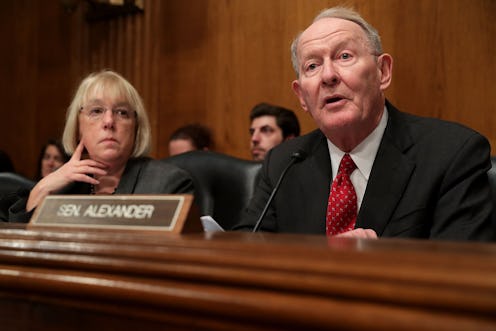News
Senators Strike A Bipartisan Deal To Save Obamacare Subsidies From Trump

On Tuesday, after a few days of tumult and consternation, Democratic Sen. Patty Murray of Washington and Republican Sen. Lamar Alexander of Tennessee reportedly reached a bipartisan deal to fund the Affordable Care Act's cost-sharing reduction payments, or CSRs, for the next two years. Last week, President Donald Trump announced his intention to halt such payments, eliminating a crucial subsidy for low-income Americans. But now, it sounds as if the bipartisan Obamacare subsidy deal could save the day, offsetting at least some of the damage done to low-income Americans who rely on the ACA to get health insurance.
That depends on it passing the House of Representatives and the U.S. Senate, however, both of which boast Republican majorities, and then being signed into law by Trump himself. Last Thursday, the White House announced that Trump was scrapping the subsidies, which are crucial to keeping premiums even remotely affordable for low-income insurance purchasers. On Tuesday, however, he signaled tentative support for the bipartisan deal, reportedly calling it a "short-term solution" that will smooth things over, and make them less "dangerous" for the next one to two years.
"It is a short term solution so that we don't have this very dangerous little period, including dangerous period for insurance companies, by the way," Trump said in a press conference at the White House Rose Garden, according to Talking Points Memo. "For a period of one year, two years, we will have a very good solution."
The biggest hurdle for the bill to overcome could conceivably be Speaker of the House Paul Ryan, a staunch anti-Obamacare ideologue and the mastermind of the GOP's first, wildly unpopular health care bill earlier this year, the American Health Care Act. Just one day prior to Murray and Alexander's announcement of the bill, as Talking Points Memo notes, Ryan made it clear that he doesn't want to be involved in "propping up" the Affordable Care Act.
Propping up Obamacare and just giving insurance subsidies to insurance carriers to keep a failing system propped up is not the answer.
An aide to Sen. Murray tells Bustle that while the new bill demonstrates there's a bipartisan path forward on health care ― and Murray and Alexander's willingness to work together to bolster the health care system, amid a tremendous amount of tension and uncertainty ― nobody is assuming the deal means the GOP will stop trying to repeal or deliberately sabotage the ACA.
The aide also tells Bustle that Democrats hope Trump will stick to the somewhat supportive tone he struck when asked about the bill in his Rose Garden presser on Tuesday, when he sounded entirely open to signing it into law if it crossed his desk. In the past, Trump has attacked the CSR payments ― critical subsidies to keep premiums down for low-income Americans ― as health insurance industry bailouts.
It's not difficult to see why Democratic lawmakers might be feeling anxious about the president making some sort of about-face on the bill. Throughout his ten months in office, Trump has repeatedly stressed that he believes allowing the Affordable Care Act to fail ― or as many have accused him of doing by halting the CSR payments, deliberately sabotaging the law ― is the best political strategy for him.
Following the failure of the GOP's so-called "skinny repeal" bill back in July, Trump again voiced his preference to see the ACA collapse, rather than attempting to replace or fix it.
And I think you'll also agree that I've been saying for a long time: Let Obamacare fail and then everybody is going to have to come together and fix it and come up with a new plan and a plan that's really good for the people with much lower premiums, much lowers costs, and much better protection.
I've been saying that ... for a long time. Let Obamacare fail. It will be a lot easier. And I think we're probably in that position where we'll just let Obamacare fail. We're not going to own it. I'm not going to own it. I can tell you, the Republicans are not going to own it.
It remains to be seen how much support the bipartisan deal will receive in Congress, and whether Ryan will bring it to the House floor. If it ultimately gets to the Trump's desk, however, the fate of these essential subsidies would once again fall squarely on his shoulders.